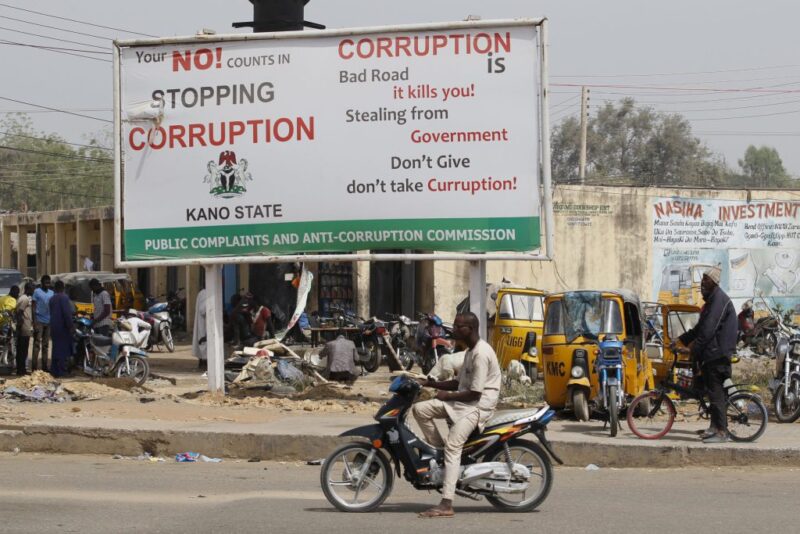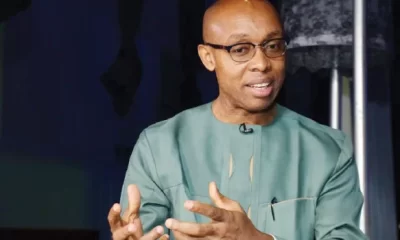Democracy & Governance
Corruption And The Way Out -By Abdulganiyu Abdulrahman Akanbi
Corruption is a global phenomenon but the menace in this country is tragically overwhelming. On 29 September, 2000, the Obasanjo-led government inaugurated the Independent Corrupt Practices Commission (ICPC) to minimize the incidence of corrupt practices in the country. To curb money laundering, in 2003, the Economic and Financial Crimes Commission was also established by the president, Olusegun Obasanjo as a law agency to investigate financial crimes in the country.

Since independence, Nigeria has not been corruption free. Things are always absurd in this country. A day will not pass without hearing a sadden happening. Unarguably, corruption has been the leading factor contributing to the underdevelopment of the country. No institution is safe from the corruption’s trap.
Over the years, corruption has been ravaging the nooks and croonies of every sector. Ranging from mismanaging of public funds, embezzlement and siphoning the treasure of the nation. Historically, no administration; military or civilian, has been found clean since the inception of Nigeria. And till date, no solution has been found to tackle the menace despite the frantic efforts by the government.
Although, corruption is a global phenomenon but the menace in this country is tragically overwhelming. On 29 September, 2000, the Obasanjo-led government inaugurated the Independent Corrupt Practices Commission (ICPC) to minimize the incidence of corrupt practices in the country. To curb money laundering, in 2003, the Economic and Financial Crimes Commission was also established by the president, Olusegun Obasanjo as a law agency to investigate financial crimes in the country.
After the creation of ICPC and EFCC, the country is recording enormous development in prosecuting and convicting many prominent Nigeria leaders but with little success. Unfortunately, few high-profile individuals face the wrath of law while majority escape justice even though, they were found guilty of the offence. In furtherance, many cases were also buried and the victims are seen in the town enjoying luxurious lifestyles. What a country!.
While Nigeria battles corruption in all sectors, the Nigeria economic stance and power have been degrading and devaluating in the world. In 2012, the country reported to have lost over $400 billion to the coldest hands of corruption since independence. Also in 2018, the country was ranked 144th in the 180 countries listed in Transparency international’s Corruption Index.
Recently, President Muhammad Buhari suspended the former acting EFCC chairman, Ibrahim Magu, on corruption Allegations. Panel was set to investigate his matter. Since the beginning of the investigation, positive results have been showing up. In the same vein, the latest corrupted institution in Nigeria is Niger Delta Development Commission (NDDC). On this, investigation is still on by the House of Representatives while the public awaits the outcome.
Without doubt, investigation proceedings on the allegedly individuals might come out positively but the question questing for answer is that, would the victim(s) face the consequence of their offence according to the law?
Nigerians are the problem of Nigeria. No outsider is laundering our funds. Our main problem is the punishment of corruption in the aspect of the constitution. This problem is attracted to the legislators. Imprisonment -for few years- is the highest penalty to punish the offenders in which bailout is also welcomed.
Few months ago, Senator Smart Adeyemi, senator representing Kogi West in the house of Senate raised a suggestion calling for the introduction of Divine laws into the constitution to fight corruption. Since then, the matter has been swept beneath the carpet and nothing was done to it.
Last year, the Chief Justice of Nigeria, Justice Ibrahim Tanko Muhammad, also called for the inclusion of the shariah law into the Nigerian Constitution so as to combat the problem of corruption and others in the country. In the same year, the sultan of Sokoto, Alhaji Muhammad Sa’ad Abubakar, called for the same solution.
On this note, I believe there is need for the introduction of religious principles as opined by many leading figures in the country. I would like to advise the National Assembly to take into account a comprehensive research and findings from the religious leaders so as to deduce laws from the religious books. I also appeal to the Federal government to strengthen the power of the judiciary for the sake of justice, fairness and accuracy.
Abdulganiyu Abdulrahman Akanbi wrote from Ilorin, kwara state. abdulganiyuabdulrahman9@gmail.com, 08063578823.



















